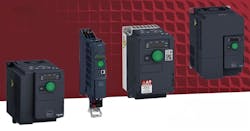RS Americas and Schneider Electric Offer Adaptable VSDs for Renewable Energy Powered Applications
RS Americas, an industrial automation and electronics distributor, now offers variable speed drives (VSDs) for solar powered pumping applications from Schneider Electric, an automation technology supplier.
VSDs are power conversion devices designed to control the speed, deceleration and torque of electric motors without the aid of mechanical components.
Schneider Electric’s Altivar Solar ATV320 VSDs are purpose-built solar drives engineered to accept varied DC supply voltages. Altivar Solar can adapt drive and motor performance to this variable power without the added equipment, engineering and maintenance costs required to use standard VSDs with solar arrays, according to Schneider Electric.
The companies note that standard VSDs are primarily designed for use with regulated AC voltage supplies. Therefore, if manufacturers want to use them with solar arrays that generate variable DC voltage, they need to be paired with battery storage and an AC inverter which adds equipment and maintenance costs.
Altivar Solar ATV320 VSDs are designed to support sustainable industrial operations, including sprinklers; micro, drip and flood irrigation systems; submersible, surface-mounted and water storage tank pumps; and off-grid, solar-powered water systems and water treatment systems.
According to Schneider Electric, the Altivar Solar ATV320 VSDs are compatible with a range of pumps and solar arrays. They are also compatible with synchronous, asynchronous and permanent magnet motors, and use open-loop controls to adjust motor torque and speed control.
The VSDs support motor control methods such as:
- Sensorless vector control, which controls AC motor speed and torque without a physical feedback device.
- Standard V/f control, which maintains a constant voltage-to-frequency ratio to control motor speed.
- Five-point V/f control, allowing users to define a V/f curve with five or more voltage and frequency points to create custom relationships for applications with high-inertia loads.
- Synchronous motor control, which adjusts power supply voltage and frequency to precisely control motor speed and torque.
- Variable torque control, which adjusts the motor’s speed and torque based on load demands.
More motion control insights from Automation World:
The Efficiency Benefits of Electrohydraulic VSDs
Motors: Workhorses of Automation
From Lab to Factory Floor: Actuator Innovations Driving Next-Gen Automation

